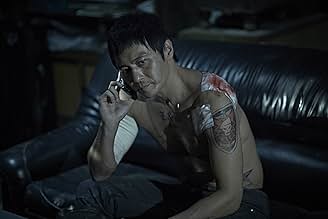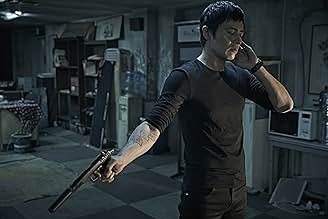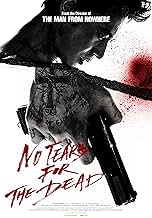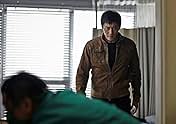VALUTAZIONE IMDb
6,7/10
7603
LA TUA VALUTAZIONE
Aggiungi una trama nella tua linguaA hit man traumatized from accidentally killing a young girl during a job is given the mission to eliminate her mother, and begins the ultimate fight to save her life.A hit man traumatized from accidentally killing a young girl during a job is given the mission to eliminate her mother, and begins the ultimate fight to save her life.A hit man traumatized from accidentally killing a young girl during a job is given the mission to eliminate her mother, and begins the ultimate fight to save her life.
- Regia
- Sceneggiatura
- Star
Recensioni in evidenza
If you enjoyed "The Man From Nowhere", you will most likely enjoy this as well. It's not nearly as flawless as "The Man From Nowhere" which I will explain shortly.
The reason I bring up the "The Man From Nowhere" is that "No Tears For the Dead" (or "Crying Man" in Korean) is a very similar movie but shot on an entirely different canvas. What I mean is you have the typical protagonist or anti-hero with a vague background that gets slowly revealed and starts developing a conscience after botching his last assignment when he accidentally kills an innocent child. He is then hired to go after the child's mother but can't bring himself to do it after he starts developing feelings for her and races to save her from his and her employers.
"No Tears For the Dead" is in no way original and the story is almost forgettable since it's been done to death but the action sequences are what makes it stand apart. The bloody and brutal fight/shooting scenes gets your adrenaline going throughout the movie. The night shots of Los Angeles are especially gorgeous which reminded me of Michael Mann's signature visual shots of Los Angeles in his flawless crime thrillers, "Heat" and "Collateral".
The lack of character development in "No Tears For the Dead" is what makes "The Man From Nowhere" so much better. In "The Man From Nowhere", you actually cared about the characters and what the protagonist goes through to save his neighbor's child. Here, it is almost nonexistent since the action sequences leave no time for them to get acquainted. However, both use the exact same format of revealing the protagonists' past that made them become who they were and it is also effectively done in "No Tears For the Dead". I came to care about the protagonist but there should've been more between the killer and mother.
The ending was also disappointing since it wasn't clear what really happens to everyone. But the final scene was a good way to end the movie on a tragic note which pretty much explains the title of the movie.
Overall, it's not as good as "The Man From Nowhere" in terms of plot and character development, but "No Tears for the Dead" is nevertheless another enjoyable entry from its director.
The reason I bring up the "The Man From Nowhere" is that "No Tears For the Dead" (or "Crying Man" in Korean) is a very similar movie but shot on an entirely different canvas. What I mean is you have the typical protagonist or anti-hero with a vague background that gets slowly revealed and starts developing a conscience after botching his last assignment when he accidentally kills an innocent child. He is then hired to go after the child's mother but can't bring himself to do it after he starts developing feelings for her and races to save her from his and her employers.
"No Tears For the Dead" is in no way original and the story is almost forgettable since it's been done to death but the action sequences are what makes it stand apart. The bloody and brutal fight/shooting scenes gets your adrenaline going throughout the movie. The night shots of Los Angeles are especially gorgeous which reminded me of Michael Mann's signature visual shots of Los Angeles in his flawless crime thrillers, "Heat" and "Collateral".
The lack of character development in "No Tears For the Dead" is what makes "The Man From Nowhere" so much better. In "The Man From Nowhere", you actually cared about the characters and what the protagonist goes through to save his neighbor's child. Here, it is almost nonexistent since the action sequences leave no time for them to get acquainted. However, both use the exact same format of revealing the protagonists' past that made them become who they were and it is also effectively done in "No Tears For the Dead". I came to care about the protagonist but there should've been more between the killer and mother.
The ending was also disappointing since it wasn't clear what really happens to everyone. But the final scene was a good way to end the movie on a tragic note which pretty much explains the title of the movie.
Overall, it's not as good as "The Man From Nowhere" in terms of plot and character development, but "No Tears for the Dead" is nevertheless another enjoyable entry from its director.
This was a great movie, good plot, good acting, lots of action, with a good story.
Worth a watch for sure.
Worth a watch for sure.
This wasn't nearly as tightly written as Jeong-beom Lee's hit The Man from Nowhere 2010, as it was riddled with convoluted scenes and plot holes. The entire almost two-hour runtime didn't flow smoothly, even with the somewhat decent pacing. There was much clarity missing in many scenes, of which some of those could've been omitted. The narrative wasn't as engaging as it should've been. There were also many shake-your-head moments that were either too overdramatic, and/or unbelievable nonsense. It did have amazing action and gore scenes, with enough blood to make even the audience slip on it. The casting and performances were decent - although some cliched. The cinematography and score were on point. Nevertheless, it's not as bad as the critics say, and it's a fun one-time watch. Just don't expect this to be as great as Lee's 2010 gem of a film.
Ironically, No Tears for the Dead, a film with themes concerning honor, power and greed, is strongly focused on mourning the deceased, conveyed emotionally through the plot, which concerns death and suicide. This subsequently reveals how simple it is to take a life, and how pointless it can often appear, while suggesting that the execution of an individual goes much deeper, the impact killing their closest friends and family who must suffer the pain, and the consequences, of their passing.
When we first meet Mo-Kyung (Kim Min-Hee), it is difficult to discern if she is aware of the tragic loss she has suffered, the professional climate she inhabits forcing her to work as she hides much of her pain, after having lost both her daughter, the adorable Yoo-Mi (Kang Ji-Woo) and husband, while the two were overseas. The use of contextualization over the duration of the feature layers the emotional depth over time, Ms. Min-Hee being responsible for one of the film's most poignantly incredible scenes, that is especially due to her exceptional talent.
However, she is not the only person suffering from this loss. Gon (Jang Dong-Gun), the hit-man responsible for inadvertently snatching away Yoo-Mi's life, a character who often appears stoic and emotionally impotent, is plagued by the trauma of his wrongdoing, while also suffering the pain of his past, the consequences of which inevitably formed his character's views and values. This pain only grows stronger as the narrative progresses, though the motivations that inspire this are largely conveyed visually, rather than being further scaffolded through dialogue, the feature, at one point, reducing this sub-plot to little more than a stereotypical cliché. Gon's inability to hide his regret is largely caused by the order he receives to terminate Mo-Kyung, to ensure she does not ask unwanted questions, in an attempt to shelter other antagonists involved in the corruption and money laundering schemes, including the vile John Lee (Kim Joon-Sung), from being apprehended by police.
Originally beginning in Los Angeles, before moving to South Korea, at least half the script is presented in English, and not only is this written in an exemplary fashion (which, unfortunately, isn't always the case with Asian movies - I'm looking at you The Viral Factor), the actors speak their lines of dialogue with educated professionalism.
As Gon fights his personal moral battles, those giving the orders begin to doubt his resolve, leading them to send his brother in arms, Charles (Brian Tee), and his proficient team, to complete his assignment, friendship and loyalty being major themes that begin to be contended. The battles that ensue are absolutely outstanding, not only being incredibly violent, sometimes hilariously so, but being intelligently thought out, as the characters attempt to out-think each other, rather than simply using brutality. In many of these instances, characters are horrifically wounded, and yet unrealistically survive, this tactic seemingly granting the plot further longevity, which may cause some viewer's to question the necessity of this action.
Occasionally, the directionality of the plot and character progression can become predictable, though that doesn't mean the film is not without its surprises. The characters, especially the villains, are capable of making dialogue reflective of black humor, though at the same time, enemies, despite exhibiting recognizable influences, can appear a little two-dimensional.
Despite the ending been quite a surprise, while beneficially fitting the narrative, the conclusion raises additional questions that are unresolved, providing limited closure, while the fate of one of the leads is entirely uncertain. Audiences throughout the story may be hoping for Gon's character to find redemption or forgiveness, and in the end, a question worth asking is: are we satisfied?
Although No Tears for the Dead is viciously entertaining, emotionally poignant, and efficaciously acted and directed, more depth could have been provided to truly resolve some of the film's most impacting story-lines.
When we first meet Mo-Kyung (Kim Min-Hee), it is difficult to discern if she is aware of the tragic loss she has suffered, the professional climate she inhabits forcing her to work as she hides much of her pain, after having lost both her daughter, the adorable Yoo-Mi (Kang Ji-Woo) and husband, while the two were overseas. The use of contextualization over the duration of the feature layers the emotional depth over time, Ms. Min-Hee being responsible for one of the film's most poignantly incredible scenes, that is especially due to her exceptional talent.
However, she is not the only person suffering from this loss. Gon (Jang Dong-Gun), the hit-man responsible for inadvertently snatching away Yoo-Mi's life, a character who often appears stoic and emotionally impotent, is plagued by the trauma of his wrongdoing, while also suffering the pain of his past, the consequences of which inevitably formed his character's views and values. This pain only grows stronger as the narrative progresses, though the motivations that inspire this are largely conveyed visually, rather than being further scaffolded through dialogue, the feature, at one point, reducing this sub-plot to little more than a stereotypical cliché. Gon's inability to hide his regret is largely caused by the order he receives to terminate Mo-Kyung, to ensure she does not ask unwanted questions, in an attempt to shelter other antagonists involved in the corruption and money laundering schemes, including the vile John Lee (Kim Joon-Sung), from being apprehended by police.
Originally beginning in Los Angeles, before moving to South Korea, at least half the script is presented in English, and not only is this written in an exemplary fashion (which, unfortunately, isn't always the case with Asian movies - I'm looking at you The Viral Factor), the actors speak their lines of dialogue with educated professionalism.
As Gon fights his personal moral battles, those giving the orders begin to doubt his resolve, leading them to send his brother in arms, Charles (Brian Tee), and his proficient team, to complete his assignment, friendship and loyalty being major themes that begin to be contended. The battles that ensue are absolutely outstanding, not only being incredibly violent, sometimes hilariously so, but being intelligently thought out, as the characters attempt to out-think each other, rather than simply using brutality. In many of these instances, characters are horrifically wounded, and yet unrealistically survive, this tactic seemingly granting the plot further longevity, which may cause some viewer's to question the necessity of this action.
Occasionally, the directionality of the plot and character progression can become predictable, though that doesn't mean the film is not without its surprises. The characters, especially the villains, are capable of making dialogue reflective of black humor, though at the same time, enemies, despite exhibiting recognizable influences, can appear a little two-dimensional.
Despite the ending been quite a surprise, while beneficially fitting the narrative, the conclusion raises additional questions that are unresolved, providing limited closure, while the fate of one of the leads is entirely uncertain. Audiences throughout the story may be hoping for Gon's character to find redemption or forgiveness, and in the end, a question worth asking is: are we satisfied?
Although No Tears for the Dead is viciously entertaining, emotionally poignant, and efficaciously acted and directed, more depth could have been provided to truly resolve some of the film's most impacting story-lines.
Another great action thriller from South Korea!
For an action film, the first half might be considered slow, but this is an effective depiction of guilt and we get a very clear idea of the emotions our hero Gon (Dong-Gun Jang) is going through. The film is also a good study of how simple events lead to a scenario of being in the wrong place at the wrong time.
Dong-Gun Jang is good as a hitman overcome by guilt, and is every bit believable during the intense action scenes and the emotional scenes. The second half of the film is full-on action in a cat and mouse game as the protagonist outwit the antagonists. The action scenes are brutal, fast-paced, and thrilling!
As with most Korean films, this one is also very unpredictable.
For an action film, the first half might be considered slow, but this is an effective depiction of guilt and we get a very clear idea of the emotions our hero Gon (Dong-Gun Jang) is going through. The film is also a good study of how simple events lead to a scenario of being in the wrong place at the wrong time.
Dong-Gun Jang is good as a hitman overcome by guilt, and is every bit believable during the intense action scenes and the emotional scenes. The second half of the film is full-on action in a cat and mouse game as the protagonist outwit the antagonists. The action scenes are brutal, fast-paced, and thrilling!
As with most Korean films, this one is also very unpredictable.
Lo sapevi?
- QuizIn order to get in character, JANG Dong-gun underwent intense training physically and mentally. He trained with a U.S. special operations unit so that he could move like the killer Gon is and even read essays by real adoptees to truly understand his character's emotions and trauma.
- BlooperNo people resides in the building where the Cops are killed. There were bomb blast and Gun firing and so on but no person came out of their houses.
- Versioni alternativeIn the original version the title appears in Korean and there are Korean captions for the English dialogues, while in the international version the title appears in English with no captions.
- ConnessioniReferenced in Taapmaan
- Colonne sonoreSmooth Operator
Written by Sade (uncredited) and Ray St. John (uncredited)
I più visti
Accedi per valutare e creare un elenco di titoli salvati per ottenere consigli personalizzati
- How long is No Tears for the Dead?Powered by Alexa
Dettagli
- Data di uscita
- Paese di origine
- Sito ufficiale
- Lingue
- Celebre anche come
- Nước Mắt Sát Thủ
- Luoghi delle riprese
- Aziende produttrici
- Vedi altri crediti dell’azienda su IMDbPro
Botteghino
- Lordo Stati Uniti e Canada
- 63.063 USD
- Fine settimana di apertura Stati Uniti e Canada
- 8329 USD
- 15 giu 2014
- Lordo in tutto il mondo
- 89.813 USD
- Tempo di esecuzione1 ora 56 minuti
- Colore
- Mix di suoni
- Proporzioni
- 2.35 : 1
Contribuisci a questa pagina
Suggerisci una modifica o aggiungi i contenuti mancanti


































